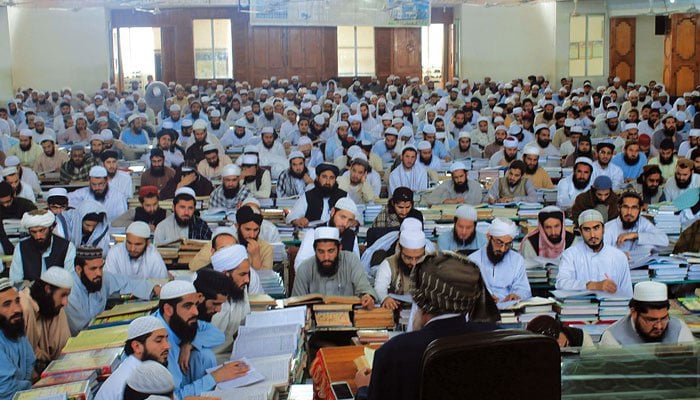The Taliban have awarded over 2,500 master’s degrees to students from religious schools in Pakistan and Afghanistan. Afghan media reports reveal that these degrees were given to students from various madrassas, including those in Pakistan. Among the recipients are graduates of Darul Uloom Haqqania, a well-known religious seminary linked to the Taliban’s leadership.
Documents indicate that between 2022 and 2023, the Taliban issued these degrees in three phases. Several Pakistani madrassas were included, such as Noor-ul-Madaris Al-Faruqia in Quetta, Darul Uloom Tajabad in Peshawar, Imdad-ul-Uloom Al-Islamiya in Peshawar, Al-Omaria in Pakistan, and Siraj-ul-Uloom in Kahi. The largest number of degrees were given to students from different branches of Darul Uloom Haqqania, a seminary in Akora Khattak, Khyber Pakhtunkhwa. This institution has historically played a major role in producing Taliban leaders.
Degrees Issued in Three Phases
-
Phase One (2023):
- Darul Uloom Haqqania, Akora Khattak: 80+ master’s degrees
- Darul Uloom Haqqania (branch): 20+ master’s degrees
- Haqqania: 10+ master’s degrees
-
Phase Two (2022):
- Darul Uloom Haqqania: 20 master’s degrees
- Haqqania: 8 master’s degrees
-
Phase Three (2022):
- Darul Uloom Haqqania: 150 master’s degrees
Darul Uloom Haqqania has long been associated with the Afghan Taliban. Many of the group’s senior leaders, including Mullah Mohammad Omar, were former students. Religious scholars and analysts say that the Taliban place immense importance on this seminary and its graduates.
“The Taliban consider Haqqania a sacred institution,” said Momin Zia Badakhshi, a religious affairs expert. “They regard its students as highly educated, similar to Oxford graduates. This madrassa holds exceptional significance for them because many top Taliban leaders studied there.”
The Taliban also awarded master’s degrees to students from jihadist madrassas inside Afghanistan. These include Jamiat Jihadi Laghman and Jihadi Madrassa Kandahar.
Academic Credibility Under Question
Many university professors in Afghanistan have criticized this move. They argue that Taliban-controlled madrassas do not follow academic standards. According to them, issuing master’s degrees from such institutions weakens the country’s education system.
“This is a serious setback for Afghanistan’s education,” said one professor. “These madrassas do not meet academic or scientific standards. Their degrees have no real value in the modern world.”
Hadi Farzam, a human rights researcher, also raised concerns. He pointed out that the curriculum in Taliban-run madrassas is outdated and does not include modern subjects. “Students in these schools do not receive contemporary education,” he explained. “Their degrees cannot be compared to those from recognized universities.”
Madrassa Graduates Replace University Professors
In January 2025, the Taliban conducted competency tests for professors in Islamic Culture and Sharia faculties at public universities in Afghanistan. After the exams, they dismissed several university professors. In their place, the Taliban appointed graduates from their religious madrassas.
Experts warn that integrating jihadist madrassa graduates into Afghanistan’s higher education system could lead to increased extremism. They fear this will have serious consequences for both Afghanistan and the surrounding region.
The close connection between Pakistani madrassas and the Afghan Taliban is a growing concern for regional security. Thousands of religious seminaries in Pakistan have strong ideological and operational ties with the Taliban, serving as recruitment and training grounds for their fighters and leaders. Many senior Taliban figures, including those in key leadership positions, have graduated from these institutions, particularly Darul Uloom Haqqania.
This raises serious questions about the role of Pakistani madrassas in fostering extremism and influencing the ideological landscape of the region. Experts warn that continued Taliban influence within these seminaries could lead to further radicalization of young students, many of whom may later join militant networks. If left unchecked, these madrassas could become centers for extremist indoctrination, threatening not only Afghanistan but also Pakistan’s own internal stability.
Given the Taliban’s growing reliance on Pakistani madrassa graduates, it is crucial for the Pakistani government to take decisive action. Authorities must ensure that these institutions do not serve as breeding grounds for extremist ideologies. There is an urgent need for stricter regulations, curriculum reforms, and oversight to prevent radical elements from using religious schools as platforms for recruitment and ideological training.
Regional security analysts emphasize that failing to address this issue could have long-term consequences. The presence of Taliban support networks within Pakistan’s madrassas could lead to an increase in extremist activities, destabilizing border regions and strengthening militant groups. The Pakistani government must recognize the gravity of the situation and implement policies to counter the spread of extremist narratives in religious institutions. Effective monitoring, de-radicalization programs, and educational reforms are essential to prevent these madrassas from further contributing to extremist movements in the region.


